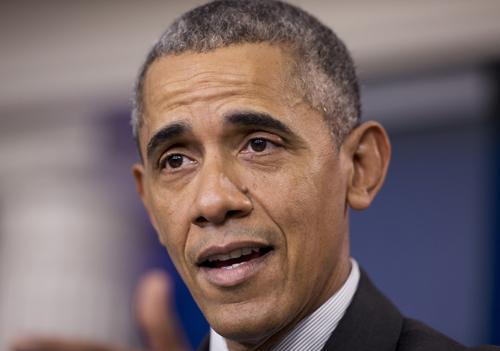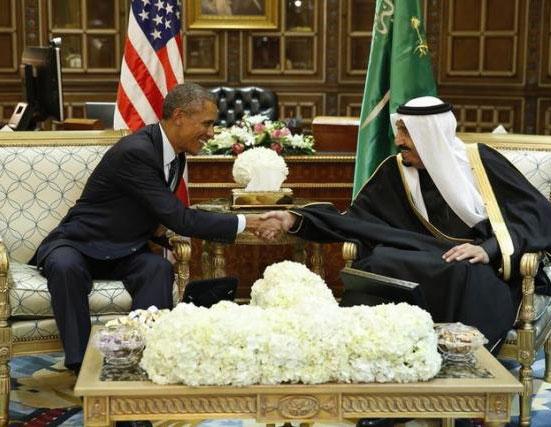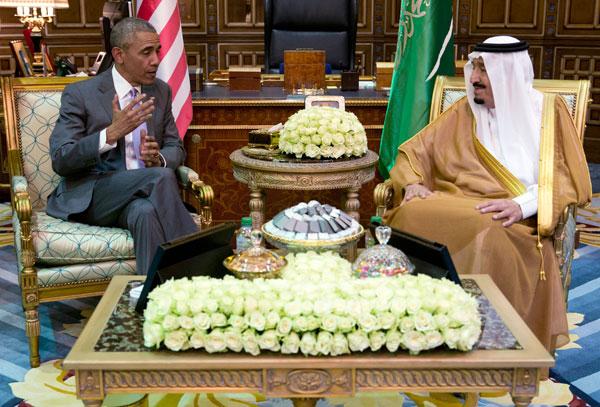You are here
With alliances strained, Obama seeks to reassure Gulf states on Iran
By Reuters - Apr 19,2016 - Last updated at Apr 19,2016

In this April 5 photo, President Barack Obama speaks in the Brady Press Briefing Room at the White House in Washington (AP photo)
RIYADH/WASHINGTON/KUWAIT — President Barack Obama travels to Saudi Arabia on Wednesday with a familiar message: the United States will not abandon its Gulf allies in their struggle against Iran, a regional power they fear is seeking to undermine their security.
Tired of what they see as a reduced commitment to old US allies, riled by comments Obama made about them in a magazine interview last month and aware there will be a new president in January, Riyadh and its neighbours may not be ready to just take his word for it.
"We want to receive tangible reassurances from them," said a senior Gulf official briefed on preparations for the meeting.
Short of a formal defence treaty, an idea rejected before a previous summit, Riyadh and its allies hope to come away from their meeting with new missile defence systems. Obama wants to find a way for Gulf states and Iran to arrive at a "cold peace" that douses sectarian tensions around the region and curbs the spread of militancy.
Neither side is likely to get much more than partial satisfaction.
Differences over how to assess and address what both the Gulf, and United States describe as Iran's destabilising activities in the Middle East have been at the root of the bumpiest period in ties between Washington and the pro-West monarchies for decades.
Sunni Muslim Gulf states fear the nuclear deal Washington and other world powers agreed with Shiite power Iran, and Obama's reluctance to get bogged down in the Middle East's complex array of disputes, has freed Tehran to act without inhibition. The exception is Oman, which for historical reasons has tried to maintain good ties with Iran and helped broker talks that led to the deal.
Riyadh in particular regards Iran's support for Syrian President Bashar Assad, Lebanon's Hizbollah, Iraqi Shiite Muslim militias and the Houthi group in Yemen as part of a struggle for the future of the Middle East.
For their part, American officials saw the possibility of an Iranian nuclear weapon and the expansion of militant groups such as Daesh as posing the greatest threat to both Gulf and US interests.
"I don't think that there can be any confusion or ambiguity on who is our partner in the region, and who isn't," said Rob Malley, Obama's adviser on Middle East issues, contrasting the depth of Washington's ties with Gulf states to its efforts to counter Iranian destabilisation of the region.
Chilly atmosphere
Obama's meetings, both with Saudi King Salman on Wednesday and a day later at a joint summit with all the heads of the Gulf Cooperation Council, which includes Saudi Arabia, Kuwait, Bahrain, Qatar, the United Arab Emirates and Oman, come in the shadow of other disagreements.
The president's own comments, in an interview with American magazine The Atlantic last month, appeared calculated to rile Gulf leaders.
He said some states in the Gulf and Europe were "free-riders" who called for US action without getting involved themselves. He also answered a question about whether Saudi Arabia was America's friend by saying "it's complicated", and said Gulf states needed to "share" the Middle East with Iran.
There was no official response from the Gulf capitals, but Saudi Prince Turki Al Faisal, a former intelligence chief, wrote an open letter condemning the remarks and questioning the wisdom of what he characterised as a US "pivot to Iran".
Meanwhile, the New York Times reported on Friday that the Saudi Arabian government has threatened to sell off hundreds of billions of dollars' worth of American assets should the US Congress pass a bill that could hold the kingdom responsible for any role in the 9/11 attacks.
Though US and Gulf officials are at pains to say the strategic relationship remains strong on many levels, friction may be evidence of longer-term trends, such as higher domestic US oil production, that alter Washington's view of the region.
"The bureaucracy is beginning to internalise this idea, that the Middle East is slightly less important to us than it used to be," said Ellen Laipson of the Stimson Center, a Washington think tank, adding that the shift was "a matter of degrees".
Vow of defence
Obama has previously vowed to defend Gulf allies against any "external attack", and the United States' military support role has allowed Saudi Arabia to maintain the campaign of an Arab coalition it has led against the Houthis in Yemen.
But talks on the more tangible assurances demanded by Gulf officials are focused for now on improving ballistic missile defence systems, something long discussed but given more urgency by Iran's recent testing of new projectiles.
"They [the Americans] should provide something," said the Gulf official briefed on preparations for the talks.
Malley told reporters that US Defence Secretary Ash Carter would be discussing US-Gulf cooperation with his counterparts the day before the summit, but Malley did not provide details about specific American assurances.
Another US official, speaking anonymously, said Gulf states had themselves made little progress on integrating their disparate anti-missile defences despite American help.
What is important to Obama, said Malley, is to put Gulf states in a position to counter destabilising activities by Iran and therefore allow them to engage with Tehran from a position of strength to resolve some of the tensions.
He described the competition between Iran and Saudi Arabia as fuelling "chaos, sectarianism and instability in the region, all of which help ISIL [Daesh] and other terrorist groups".
He also said the Saudi-led military campaign in Yemen, regarded in Riyadh as an important stand against perceived creeping Iranian influence in the wake of Washington's reduced engagement in the Middle East, had distracted from the fight against militancy.
Such comments are seen in the Gulf as naive. "It is important for the Americans to understand that we are not happy with the overtures that the United States has been prepared to make towards Iran at our expense," said the Gulf official.
Still, if this week's summit can increase cooperation on security and intelligence that ultimately bolster their position against Iran, the Gulf monarchs may still consider it a win.
Related Articles
RIYADH — Saudi Arabia's King Salman will meet US President Barack Obama in Washington on Friday, aiming to push him for more support in Riya
RIYADH — US President Barack Obama met Saudi Arabia's King Salman on Wednesday to seek joint action on security threats including Iran and t
US President Barack Obama led a heavyweight delegation to Saudi Arabia Tuesday to meet new King Salman and discussed the two countries' ongoing fight against the Islamic State (IS) group.


















